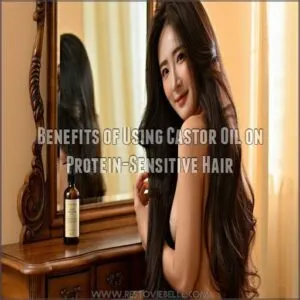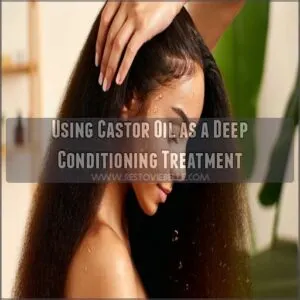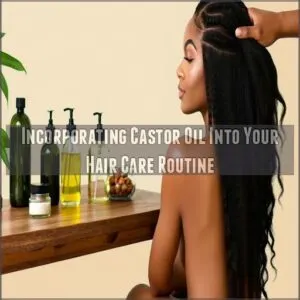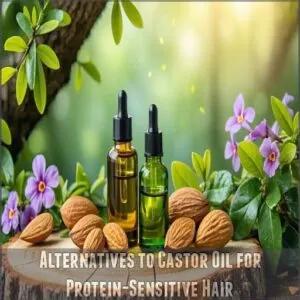This site is supported by our readers. We may earn a commission, at no cost to you, if you purchase through links.
 Struggling with protein-sensitive hair? Castor oil might be your secret weapon!
Struggling with protein-sensitive hair? Castor oil might be your secret weapon!
This miracle oil strengthens your locks without the protein overload that can leave hair feeling brittle. It’s packed with ricinoleic acid and omega-6 fatty acids that create a protective barrier, keeping your strands hydrated and flexible.
You’ll love how it nourishes from the inside out, preventing protein loss while maintaining that delicate moisture balance.
Whether you’re using it as a pre-shampoo treatment or deep conditioning mask, castor oil can transform your hair care routine. Just a little goes a long way in bringing life back to protein-sensitive tresses. Ready to discover healthier, happier hair?
Table Of Contents
- Key Takeaways
- Benefits of Using Castor Oil on Protein-Sensitive Hair
- How to Use Castor Oil for Protein-Sensitive Hair
- Alternatives to Castor Oil for Protein-Sensitive Hair
- Signs of Protein Overload in Protein-Sensitive Hair
- How to Determine if Your Hair is Protein-Sensitive
- Understanding The Role of Coconut Oil in Protein-Sensitive Hair
- Recommended Protein-Free Hair Products for Protein-Sensitive Hair
- Tips for Maintaining Healthy Hair With Protein Sensitivity
- Frequently Asked Questions (FAQs)
- How to use castor oil for hair care?
- Does castor oil help with the growth of a beard?
- Does castor oil make hair stronger?
- How to use castor oil for hair growth & thickness?
- Does castor oil prevent hair loss?
- Is castor oil good for hair follicles?
- Does castor oil add protein to hair?
- How do you treat protein sensitive hair?
- What oil is good for protein overload hair?
- What are the disadvantages of castor oil for hair?
- Conclusion
Key Takeaways
- You’ll want to listen to your hair’s unique needs if you’re dealing with protein sensitivity, as castor oil can provide moisture without overwhelming your strands with protein overload.
- By using castor oil strategically, you’ll protect your hair from breakage, create a protective barrier, and maintain a delicate moisture balance that keeps your locks healthy and flexible.
- You’ll need to be cautious about protein treatments, watching for signs like dry, brittle hair and excessive breakage that indicate you’re pushing your hair’s protein tolerance too far.
- Don’t go it alone – consider consulting a hair care professional who can help you develop a personalized routine that addresses your specific protein-sensitive hair challenges and finds the right balance of moisture and care.
Benefits of Using Castor Oil on Protein-Sensitive Hair
If you’re struggling with protein-sensitive hair, castor oil might just be your new best friend.
This nutrient-rich oil can strengthen your locks, provide deep moisture, and prevent breakage without overwhelming your delicate strands with extra proteins.
Strengthens Hair From The Inside Out
Right beneath the surface, castor oil works its magic on protein-sensitive hair, delivering ricinoleic acid benefits that fortify your hair shaft from within.
By penetrating deep into your follicles, it provides internal repair without overwhelming delicate strands.
You’ll notice reduced breakage and increased strength, all thanks to this incredible oil’s ability to nourish and protect your hair’s most vulnerable areas.
Prevents Protein Loss in Hair
Reinforcing your hair’s natural strength starts with understanding protein loss prevention. When your locks are protein-sensitive, traditional treatments can leave you high and dry – literally.
Castor oil steps in as your hair’s superhero, blocking protein loss without adding extra stress to delicate strands. Its unique molecular structure helps create a protective barrier, keeping your hair’s protein where it belongs.
By incorporating this powerhouse oil into your routine, you’ll shield your hair from breakage and maintain its natural resilience. Mix castor oil with complementary oils like jojoba or almond to customize your hair protein balance strategy and give your strands the TLC they desperately need.
Provides Moisture and Nourishment
After strengthening your hair’s protein foundation, it’s time to quench its thirst with castor oil‘s moisture magic. This powerhouse natural oil transforms protein-sensitive hair with its nourishing properties:
- Delivers deep hydration without protein overload
- Restores moisture lost from heat and chemical treatments
- Promotes scalp health with omega-6 fatty acids
- Creates a protective barrier against environmental damage
- Helps maintain the delicate protein-moisture balance
Using castor oil for its anti-aging benefits can also have a positive impact on the skin, making it a versatile ingredient for overall beauty care.
Imagine your hair drinking in pure, rich moisture – that’s castor oil at work. Apply sparingly to damp strands, letting this liquid gold revive and protect your locks from root to tip. Your protein-sensitive hair will thank you with renewed softness and strength.
How to Use Castor Oil for Protein-Sensitive Hair
If you’re battling protein-sensitive hair that’s prone to breakage, castor oil might just be your holy grail solution.
With its unique ability to moisturize and strengthen without adding stiffness, you’ll discover how this magical oil can transform your hair care routine and breathe life into your delicate locks.
Applying Castor Oil as a Pre-Shampoo Treatment
Got tangled hair woes? Meet your new bestie: the castor oil pre-shampoo treatment. This protein-free oil is a game-changer for sensitive strands, delivering serious moisture without the protein overload.
Gently massage a small amount into your scalp about 10 minutes before washing, letting the magic happen. The ricinoleic acid works overtime, protecting your locks from breakage and dryness.
It’s like a superhero shield for your hair, keeping those precious curls strong, hydrated, and ready to take on the world.
Using Castor Oil as a Deep Conditioning Treatment
Hair roots rejoice when castor oil swoops in as a deep conditioning superhero for protein-sensitive locks. This miracle oil penetrates your strands, delivering intense moisture without the protein punch that can leave your hair feeling brittle.
When you’re ready to transform your hair care routine, warm a small amount of castor oil between your palms and gently massage it into your scalp and hair lengths. The key is a light touch – you want to nourish, not weigh down your delicate strands.
Focus on your ends, where damage tends to hide, and let the oil work its magic for 30 minutes before washing. Pro tip: Mix with a carrier oil like jojoba to enhance absorption and make application smoother.
Your protein-sensitive hair will thank you with renewed softness and strength.
Incorporating Castor Oil Into Your Hair Care Routine
After deep conditioning, your hair care journey continues with a game-changing ally: castor oil. Seamlessly incorporate this powerhouse into your routine by mixing it with other nourishing oils like jojoba or almond for maximum hair growth benefits.
Perform a gentle scalp massage using your custom oil blend, targeting each strand with precision. Pro tip for protein-sensitive locks: start small and watch how your hair responds.
The magic lies in finding your perfect balance – not too heavy, not too light. Experiment with different application methods: pre-shampoo treatments, leave-in conditioners, or weekly deep nourishment sessions.
Your hair will thank you with renewed strength and shine.
Alternatives to Castor Oil for Protein-Sensitive Hair
When you’re battling protein-sensitive hair, finding the right alternative to castor oil can feel like a hair care treasure hunt.
Don’t worry—with options like jojoba, almond, and argan oils, you’ll discover nourishing alternatives that’ll keep your locks moisturized and healthy without triggering protein overload.
Jojoba Oil
Want to level up your protein-sensitive hair care? Jojoba oil might just be your secret weapon. This natural wonder mimics your scalp’s own sebum, diving deep into your hair follicles with unmatched precision. Its molecular magic helps protect against environmental damage while keeping your locks hydrated and happy.
Perfect for those struggling with protein sensitivity, jojoba oil creates a protective shield that locks in moisture without weighing down your strands. You’ll love how it balances scalp health, fights product buildup, and provides gentle nourishment for all hair types.
Additionally, incorporating argan oil benefits into your routine can further enhance your hair’s overall health and appearance. Whether you’re mixing it with other oils or using it solo, jojoba is a game-changer for maintaining healthy, vibrant hair.
Almond Oil
Though protein-sensitive hair demands extra care, almond oil emerges as a powerful ally in your hair care arsenal.
Rich in vitamins A, B1, B2, D, and E, this lightweight oil delivers essential nutrients without overwhelming your delicate strands.
Its omega-3 fatty acids work magic on scalp health, soothing inflammation and revitalizing dull hair from root to tip.
If you’re battling protein sensitivity, almond oil’s gentle touch provides the nourishment you crave without the stiffness of traditional protein treatments.
It’s like a secret weapon for those seeking soft, manageable locks that feel naturally strong and resilient.
Your hair will thank you for this natural, protein-free remedy.
Argan Oil
After exploring almond oil’s magic for protein-sensitive hair, let’s zoom in on another hair-transforming hero: Argan oil. This liquid gold is a game-changer for folks battling protein sensitivity and dry, lifeless locks.
Argan oil brings some serious hair-healing superpowers:
- Packed with omega fatty acids that restore shine and strength
- Lightweight formula that won’t weigh down your precious curls
- Natural protection against environmental hair damage
- Suitable for all hair types, especially sensitive scalps
Massage this miracle oil into damp or dry hair, and watch your strands come back to life. Its non-greasy texture means you’ll get moisture without the dreaded product buildup. For protein-sensitive hair, argan oil is your secret weapon – delivering nourishment and protection without triggering those pesky protein overload symptoms.
Signs of Protein Overload in Protein-Sensitive Hair
If you’ve been piling on protein treatments and suddenly noticed your hair feeling like straw, you might be experiencing protein overload.
Your locks are crying out for help, signaling through telltale signs like excessive breakage, a stiff and crunchy texture, and an overall dry, brittle appearance.
This screams it’s time to switch up your hair care routine.
Dry and Brittle Hair
Battling dry, brittle hair? Protein sensitivity might be your hair’s silent saboteur, turning luscious locks into a fragile mess.
Castor oil emerges as a superhero, packed with omega-6 fatty acids that breathe life into stressed strands. By focusing on hydration techniques and restoring moisture, you’ll combat the dreaded protein overload.
The key is understanding your hair’s unique needs – using oil-based products like castor oil can dramatically improve elasticity and prevent further damage. Don’t just moisturize; strategically nourish your protein-sensitive hair.
Excessive Hair Breakage
Dry, brittle strands giving way to constant hair breakage? You’re likely wrestling with protein overload. When your hair starts snapping like twigs, it’s time to hit the reset button on your hair care routine.
Castor oil emerges as a superhero for protein-sensitive locks, offering a gentle lifeline to damaged tresses. Reducing breakage isn’t just about switching products – it’s about understanding your hair’s unique language.
Avoid products packed with hydrolyzed proteins that can turn your hair into a fragile mess. Instead, opt for moisture-rich treatments that strengthen without stiffening. Using castor oil hair care products can be an effective way to nourish and protect your hair.
Deep conditioning becomes your new best friend, helping repair and protect those vulnerable strands. Remember, your hair’s health is a delicate balance – treat it with the TLC it deserves.
Stiff and Crunchy Hair Texture
Ever noticed your hair feeling like straw after a protein treatment? That stiff, crunchy texture isn’t just annoying—it’s a red flag for protein-sensitive hair. When your strands become rigid and lifeless, you’re dealing with protein overload.
- Pro tip: Listen to your hair’s SOS signals before serious damage sets in!
Castor oil swoops in as your hair’s superhero, packed with omega-6 fatty acids that restore moisture without protein bombardment. Before grabbing any product, scan labels for keratin, silk, or hydrolyzed proteins that might trigger sensitivity. These ingredients can transform your soft locks into a brittle mess faster than you can say "bad hair day."
The right balance isn’t about avoiding proteins completely—it’s about understanding your hair’s unique porosity and giving it exactly what it craves.
How to Determine if Your Hair is Protein-Sensitive
If you’re wondering whether your hair is protein-sensitive, you’re not alone in this hairy predicament.
By learning to recognize the telltale signs of protein overload and understanding your hair’s unique needs, you’ll be on your way to healthier, happier locks.
Conducting a Patch Test
Your hair’s resilience starts with a simple patch test – your secret weapon against potential protein overload and allergic reactions.
By strategically testing castor oil, you’ll discover key insights into your hair’s unique personality.
| Test Step | Details |
|---|---|
| Area | Small hair section |
| Product | Pure castor oil |
| Application | Thin layer |
| Wait Time | 24-48 hours |
| Watch For | Irritation, redness |
Observe closely for any signs of sensitivity: itching, redness, or unusual texture changes.
This detective work prevents potential hair disasters and helps your protein-sensitive locks stay healthy, happy, and breakage-free.
Your scalp will thank you later!
Consulting With a Hair Care Professional
After patch testing, you might still feel puzzled about your hair’s protein sensitivity. A hair specialist can be your secret weapon in unraveling the mystery of your locks. Professional guidance offers more than just a quick fix – it’s a roadmap to healthier hair.
When consulting an expert, expect:
- Detailed hair analysis
- Personalized product recommendations
- Customized care strategy
- Expert opinion on castor oil suitability
Hair professionals understand the nuanced world of protein-sensitive hair. They’ll help you navigate tricky treatment options, potentially recommending castor oil as a gentle, protein-free solution. With their expert insight, you’ll transform hair confusion into confident care, ensuring your tresses stay strong, moisturized, and beautifully balanced.
Understanding The Role of Coconut Oil in Protein-Sensitive Hair
If you’re managing the tricky world of protein-sensitive hair, you’ll want to understand how coconut oil might impact your locks.
While coconut oil is protein-free, it’s not a one-size-fits-all solution.
It can potentially cause dryness or sensitivity for some hair types, so you’ll need to approach it with careful consideration.
Coconut Oil as a Protein-Free Oil
If you’ve been wondering about coconut oil’s magic for protein-sensitive hair, listen up. This protein-free oil could be your hair’s new best friend.
Packed with fatty acids and nourishing properties, coconut oil strengthens strands without adding protein.
It’s like a protective shield for your locks, improving scalp elasticity and battling frizz.
While not a one-size-fits-all solution, coconut oil offers a lightweight approach to hair care that can help maintain moisture and prevent damage for many hair types.
Potential Sensitivity to Coconut Oil
Coconut oil might seem like a miracle worker, but it’s not always a perfect match for your protein-sensitive locks. Think of your hair like a delicate ecosystem – what works for one person might wreak havoc on another. While coconut oil boasts impressive properties, it can sometimes cause dryness or damage, especially if your hair’s porosity is playing hard to please.
Before you go all-in, do a patch test. Your hair’s unique personality matters! Some folks find coconut oil strips moisture faster than a desert wind, leaving strands feeling brittle and stressed. Low porosity hair is particularly vulnerable to this oil’s protein-like behavior.
Pro tip: Watch how your hair responds. If you’re noticing increased breakage or that dreaded straw-like texture, it might be time to break up with coconut oil and explore more protein-sensitive friendly alternatives.
Exploring Other Oil Options
When diving into protein-sensitive hair care, you’ll want to explore a treasure trove of nourishing oils beyond coconut. Murumuru butter can add an extra punch of moisture, helping you navigate the tricky waters of protein-sensitive hair care with confidence and style.
Jojoba oil stands out as a moisture-magnet, while almond oil shields your strands from environmental attacks. Macadamia oil provides rich nutrients that strengthen delicate strands.
Argan oil works its magic by taming frizz and fortifying hair from root to tip. Grapeseed oil offers lightweight hydration, and avocado oil deeply conditions without weighing down your locks.
Understanding hair porosity and oil selection is also important to finding the right oil for your hair type. Pro tip: mix and match these oils to create a personalized hair care cocktail that meets your unique needs.
Recommended Protein-Free Hair Products for Protein-Sensitive Hair
If you’re struggling with protein-sensitive hair, finding the right products can feel like searching for a needle in a haystack.
Don’t worry—we’ve got you covered with a curated selection of protein-free hair products that’ll nourish your locks without causing breakage or stiffness.
Curlsmith Double Cream Deep Quencher
After understanding coconut oil’s limitations, you’ll find your hair’s new best friend: Curlsmith Double Cream Deep Quencher. This protein-free hydration powerhouse transforms ultra-dry, dull locks with its magical blend of Andiroba and Resurrection Flower.
You’ll love how it eliminates frizz and adds killer shine without sulfates, silicones, or mineral oils. Perfect for protein-sensitive hair, this deep conditioner works like a charm – but proceed with caution. Always test a small section first to avoid unwanted surprises.
Using natural ingredients can greatly enhance the overall health and appearance of your hair. With its carefully crafted formula, the Deep Quencher promises to quench your hair’s deepest moisture cravings, giving you the confidence to rock your most stunning, healthy curls.
TGIN Honey Miracle Hair Mask
Since curly hair craves TLC, the TGIN Honey Miracle Hair Mask emerges as a game-changer for protein-sensitive locks. Packed with raw honey, olive and jojoba oils, and vitamins A, E & D, this mask delivers deep hydration without protein overload.
You’ll love how it tackles dryness while giving your curls some serious love. The slip formula glides through tangled strands, reducing breakage and enhancing curl definition.
Free from sulfates, parabens, and artificial colors, it’s a clean beauty dream for sensitive hair types. Whether you’re battling frizz or seeking moisture-rich nourishment, this mask works overtime to transform your hair from dry and brittle to soft and manageable.
Say goodbye to bad hair days and hello to your new hair hero.
Eden BodyWorks Jojoba Monoi Deep Conditioner
Discover the benefits of ultra-nourishing hair care with Eden BodyWorks Jojoba Monoi Deep Conditioner – your protein-sensitive hair’s new best friend. This powerhouse treatment brings seriously good news for locks craving moisture without the protein punch.
For more shopping options on this product, check out the deep conditioner products.
- Packed with jojoba and monoi oils to hydrate deeply
- Protects against environmental stress and styling damage
- Restores hair’s natural balance without protein overload
Perfect for those walking the tightrope of hair protein sensitivity, this deep conditioner works like a charm. It’s your secret weapon against dry, brittle strands, delivering intense hydration that speaks directly to your hair’s deepest needs.
No protein, just pure moisture magic.
Tips for Maintaining Healthy Hair With Protein Sensitivity
If you’re struggling with protein-sensitive hair, you’re not alone in your quest for the perfect hair care routine.
Castor oil can be your secret weapon, offering moisture and strength without the protein-induced stiffness that can leave your locks feeling brittle and damaged.
Balancing Protein and Moisture in Your Hair Care Routine
After discovering game-changing protein-free products, you’ll want to master the art of balancing hair moisture levels and protein. Your protein-sensitive hair craves a strategic approach that keeps it flexible and strong.
Think of your hair care routine like a delicate dance – alternating between lightweight moisturizing products and rich hydrating treatments prevents protein overload and breakage. Castor oil becomes your secret weapon, packed with omega-6 fatty acids that support hair elasticity without adding extra protein.
Understanding hair food basics is essential for creating a personalized routine that addresses your hair’s specific needs. Pay attention to your hair’s porosity and how it responds to different products.
Some days it’ll need more moisture, others a gentler touch. By listening to your locks and adjusting your routine, you’ll maintain that perfect moisture retention and keep your hair looking healthy and vibrant.
Regular Deep Conditioning Treatments
Balancing protein and moisture starts with smart deep conditioning for protein-sensitive hair. Your hair craves regular hydration without the protein punch that can make strands stiff and brittle.
Reach for castor oil-based deep conditioning masks that’ll keep your locks supple and strong. Treatment frequency matters: aim for weekly deep conditioning sessions suited to your hair’s porosity.
Moisturizing leave-ins packed with castor oil can be your hair’s best friend, offering overnight treatment magic that repairs and protects.
Pro tip: Listen to your hair. If it’s feeling dry or looking lackluster, it’s time to show some love with a nourishing, protein-free deep conditioning treatment.
Gentle Handling and Protective Styling
When your protein-sensitive hair feels like a fragile masterpiece, mastering gentle handling becomes your secret weapon.
Minimize breakage by wielding wide-tooth combs or your fingers as detangling allies, always starting from the ends and working gently upward. Protective wrapping with silk scarves or satin bonnets shields your locks from harsh environmental challenges like wind and UV rays.
Low-manipulation styles—think braids, twists, and buns—reduce stress on delicate strands while preserving moisture. For ideal hair care, using castor oil products can provide numerous benefits.
Castor oil for protein-sensitive hair acts as a nurturing guardian, offering deep hydration without protein build-up. By treating your hair like the precious crown it is, you’ll transform vulnerability into strength, one gentle touch at a time, and discover the benefits of using castor oil products for protein-sensitive hair.
Frequently Asked Questions (FAQs)
How to use castor oil for hair care?
Sarah’s dry, brittle hair transformed after she discovered castor oil.
You’ll want to massage it into your scalp, leave it for 30 minutes, then shampoo thoroughly.
Use sparingly, mix with a carrier oil, and watch your hair health improve dramatically.
Does castor oil help with the growth of a beard?
You’ll find castor oil can boost beard growth by improving blood circulation and providing essential nutrients.
Its ricinoleic acid stimulates hair follicles, potentially helping you achieve a fuller, healthier beard with consistent application.
Does castor oil make hair stronger?
Ironically, weak hair’s worst nightmare might just be castor oil.
Its ricinoleic acid and omega-6 fatty acids fortify your strands, reducing breakage and boosting strength, making your locks resilient and ready to tackle any hair challenge.
How to use castor oil for hair growth & thickness?
Massage warm castor oil into your scalp weekly, focusing on roots and hair tips.
Leave for 30 minutes before washing.
Mix with lighter oils like coconut for easier application and better absorption, boosting hair growth potential.
Does castor oil prevent hair loss?
Ever wondered if castor oil can stop hair loss?
You’re in luck! Its ricinoleic acid boosts blood circulation, strengthens follicles, and promotes growth.
While not a miracle cure, it’s a powerful ally in your fight against hair thinning.
Is castor oil good for hair follicles?
Castor oil nourishes hair follicles by boosting blood circulation and delivering essential nutrients. Its ricinoleic acid stimulates growth, strengthens roots, and provides deep hydration without overwhelming your delicate strands.
Does castor oil add protein to hair?
When nature’s liquid gold embraces your locks, rest assured it won’t burden your strands with protein.
Castor oil’s fatty acids nourish and moisturize without protein overload, making it a gentle, hydrating ally for your delicate tresses.
How do you treat protein sensitive hair?
You’ll want to balance moisture and protein carefully.
Test your hair’s sensitivity, use protein-free deep conditioners, and opt for nourishing oils like jojoba or olive.
Adjust your routine based on your hair’s unique response and needs.
What oil is good for protein overload hair?
Like a rescue remedy for stressed strands, jojoba, olive, and almond oils are your salvation.
These protein-free oils nourish and hydrate, helping your hair bounce back from protein overload without weighing it down or causing further damage.
What are the disadvantages of castor oil for hair?
Castor oil can be thick and difficult to wash out, potentially causing build-up.
It might trigger allergic reactions, leave an unpleasant smell, and can be messy to apply.
Some people find it challenging to remove from their hair completely.
Conclusion
Discover your hair’s potential with castor oil, your protein-sensitive tresses’ new best friend.
Like a gentle guardian, this miracle oil shields and nourishes, preventing protein loss while maintaining moisture balance.
You’ll transform your hair care routine, discovering healthier, more resilient locks.
By understanding your hair’s unique needs and embracing castor oil for protein-sensitive hair, you’re not just treating your hair – you’re empowering it to thrive, strand by strand, with moisture balance.


















